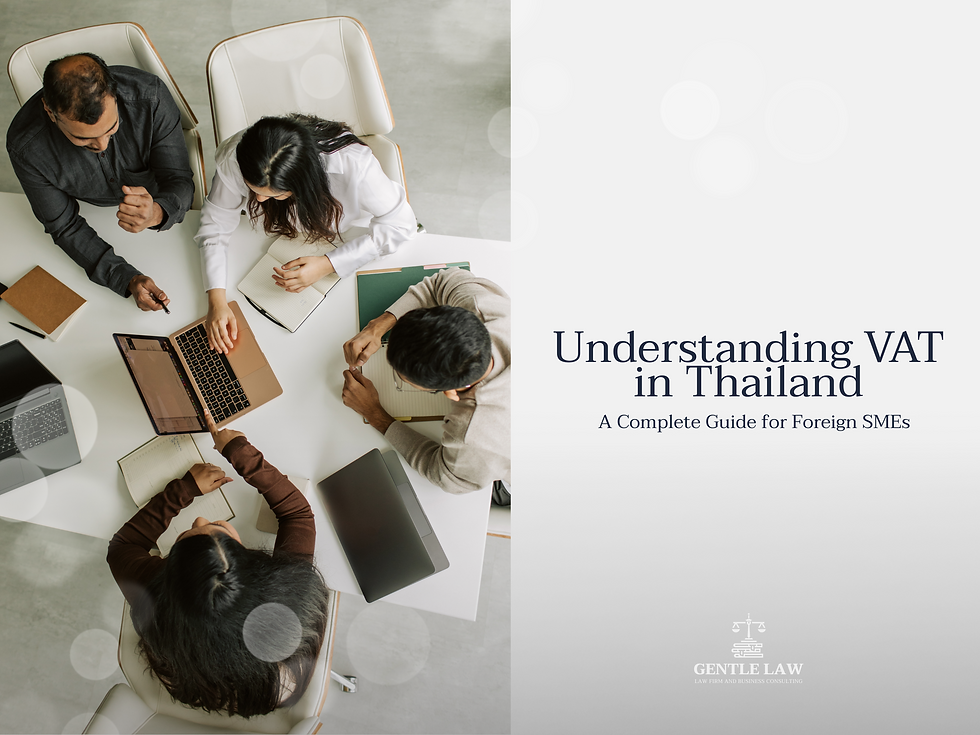Understanding VAT in Thailand: A Complete Guide for Foreign SMEs
- gentlelawlawfirm
- Jul 28, 2025
- 3 min read

Understanding VAT in Thailand: A Complete Guide for Foreign SMEs
Value-Added Tax (VAT) in Thailand is a crucial compliance element for any foreign-owned SME operating in the country. Misunderstanding or neglecting VAT obligations can result in significant legal exposure, including administrative penalties, interest surcharges, and potential disruption to operations.
At GENTLE LAW IBL, we provide trusted, one-stop legal support tailored to foreign businesses. This guide explains who must register, how to register, and how to comply with Thailand's VAT regime—ensuring you're legally protected and optimized for operational success.
📌 What Is VAT in Thailand?
Under Thailand’s Revenue Code, Part 4 of the VAT Act B.E. 2534 (1991), VAT in Thailand is a consumption-based tax collected at each stage of the supply chain. The current standard rate is 7%. The VAT rate has been temporarily reduced from its previous 10% rate under Royal Decree reductions (e.g., Royal Decree No. 744, B.E. 2566), and this may be extended.
VAT is imposed on:
Sales of goods
Provision of services
Importation of goods into Thailand
✅ Who Must Register for VAT in Thailand?
Entities must register for VAT within 30 days once they meet any of the following criteria (per Revenue Code, Section 85):
Annual VATable turnover exceeding THB 1.8 million within any 12-month period
Engaging in import or export activities (regardless of turnover)
Providing digital or cross-border services to recipients in Thailand (in compliance with Section 77/1 and recent amendments in line with OECD's BEPS Action 1)
🔹 Voluntary VAT Registration: Permissible for entities below the THB 1.8M threshold if they wish to claim input tax credits.
🛠️ How to Register for VAT in Thailand
Step 1: Gather Company Documents
Certificate of Incorporation
Articles of Association
List of Shareholders (BOJ.5)
Company Affidavit (issued within 30 days)
Proof of Registered Address (Lease Agreement or Ownership Evidence)
Step 2: Submit VAT Registration (Form ภ.พ.01)
Submit to the local Revenue Department Office or via e-Filing on RD.go.th
Include certified copies of all supporting documents
Step 3: Receive VAT Certificate
Receive VAT Registration Certificate (Form ภ.พ.20)
Display visibly at your business premises
⏳ Approval Timeframe: Typically within 5–10 business days, if documentation is complete.
🔄 Ongoing VAT Compliance for SMEs
Task | Frequency | Key Details |
Filing VAT Return (Form ภ.พ.30) | Monthly (by 15th of following month) | Report Output VAT & Input VAT |
VAT Payment | Monthly (same deadline as filing) | Late payment incurs 1.5%/month interest + administrative penalties |
Record Keeping | Maintain for 5 years | Invoices, receipts, and ledgers in Thai or English |
Tax Invoices | Per transaction | Must include VAT ID, description, amount, and date |
📌 Note: Tax invoices must comply with Section 86/4 of the Revenue Code. Only tax invoices issued by VAT-registered suppliers are creditable.
⚠️ Common VAT Pitfalls & How to Avoid Them
Pitfall | Risk | GENTLE LAW IBL’s Recommended Solution |
Missing THB 1.8M Threshold | Late registration penalties | Monitor monthly turnover proactively |
Non-compliant Tax Invoices | Input VAT credit denied | Use Por Por 20 format with full fields |
Late Filing or Payment | Penalties and audit risk | Implement calendar alerts & auto-filing tools |
Claiming Non-VATable Purchases | Input credit rejected | Verify vendor’s VAT registration ID |
Poor Recordkeeping | Legal non-compliance | Maintain digital backups and audit logs |
💡 Best Practices for VAT in Thailand (H2 with focus keyword)
Price Transparently: Always display VAT-inclusive prices in B2C transactions, as required under Consumer Protection Act B.E. 2522.
Automate Accounting: Use Thai-compliant accounting tools (e.g., PEAK, FlowAccount) for returns and recordkeeping.
Train Key Staff: Educate finance teams on timelines, required documents, and risk triggers.
Maintain Cash Flow Discipline: Treat collected VAT as a liability—not as usable operating cash.
Conduct Internal VAT Audits: Schedule quarterly reviews to ensure accuracy and prevent Revenue Department audits.
🛡️ How GENTLE LAW IBL Supports Foreign SMEs
Our multilingual team at GENTLE LAW IBL offers legal services that bridge regulatory compliance with commercial success. We provide:
✅ Full-service VAT registration and document preparation ✅ Filing and submission support (e-Filing) ✅ Review and correction of VAT invoices ✅ Input tax optimization analysis ✅ Representation during Revenue Department audits or investigations
With GENTLE LAW IBL, your VAT in Thailand becomes predictable, compliant, and business-friendly.
📩 Ready to Optimize Your VAT Compliance?
Contact GENTLE LAW IBL today to book a VAT compliance assessment: 👉 www.gentlelawibl.com



